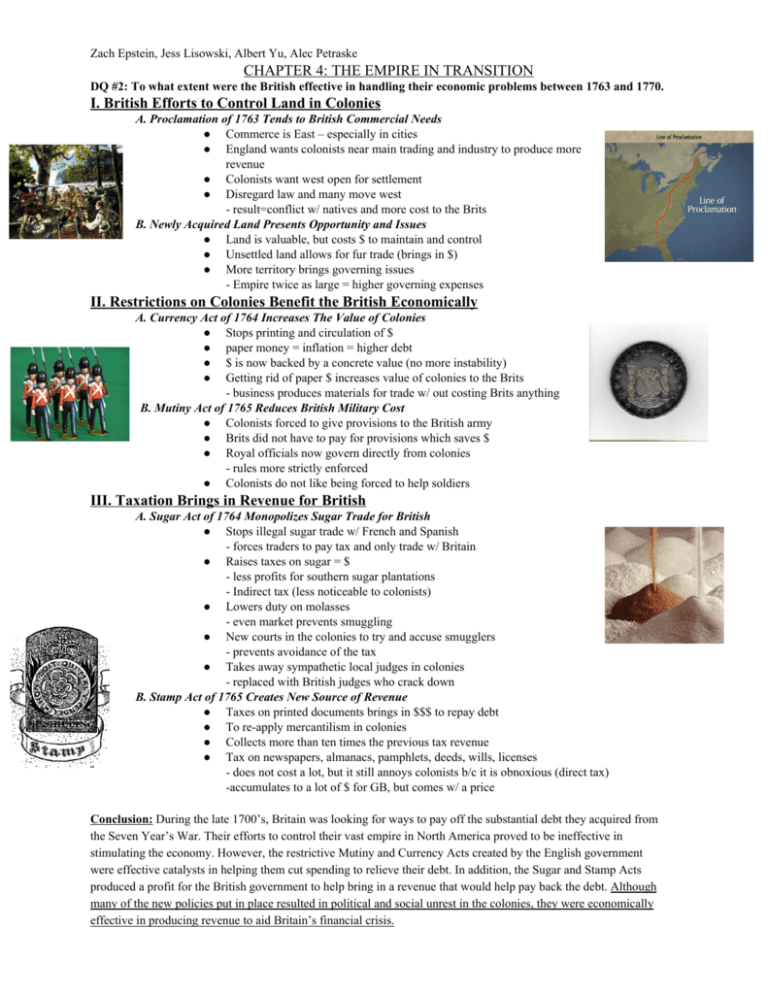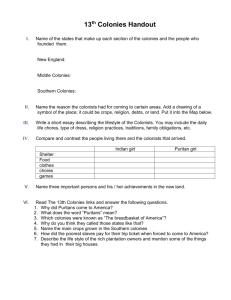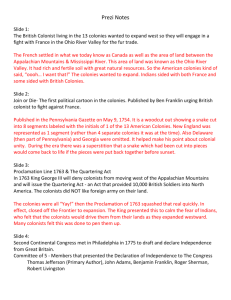CHAPTER 4: THE EMPIRE IN TRANSITION I. British Efforts to
advertisement

Zach Epstein, Jess Lisowski, Albert Yu, Alec Petraske CHAPTER 4: THE EMPIRE IN TRANSITION DQ #2: To what extent were the British effective in handling their economic problems between 1763 and 1770. I. British Efforts to Control Land in Colonies A. Proclamation of 1763 Tends to British Commercial Needs ● Commerce is East – especially in cities ● England wants colonists near main trading and industry to produce more revenue ● Colonists want west open for settlement ● Disregard law and many move west ­ result=conflict w/ natives and more cost to the Brits B. Newly Acquired Land Presents Opportunity and Issues ● Land is valuable, but costs $ to maintain and control ● Unsettled land allows for fur trade (brings in $) ● More territory brings governing issues ­ Empire twice as large = higher governing expenses II. Restrictions on Colonies Benefit the British Economically A. Currency Act of 1764 Increases The Value of Colonies ● Stops printing and circulation of $ ● paper money = inflation = higher debt ● $ is now backed by a concrete value (no more instability) ● Getting rid of paper $ increases value of colonies to the Brits ­ business produces materials for trade w/ out costing Brits anything B. Mutiny Act of 1765 Reduces British Military Cost ● Colonists forced to give provisions to the British army ● Brits did not have to pay for provisions which saves $ ● Royal officials now govern directly from colonies ­ rules more strictly enforced ● Colonists do not like being forced to help soldiers III. Taxation Brings in Revenue for British A. Sugar Act of 1764 Monopolizes Sugar Trade for British ● Stops illegal sugar trade w/ French and Spanish ­ forces traders to pay tax and only trade w/ Britain ● Raises taxes on sugar = $ ­ less profits for southern sugar plantations ­ Indirect tax (less noticeable to colonists) ● Lowers duty on molasses ­ even market prevents smuggling ● New courts in the colonies to try and accuse smugglers ­ prevents avoidance of the tax ● Takes away sympathetic local judges in colonies ­ replaced with British judges who crack down B. Stamp Act of 1765 Creates New Source of Revenue ● Taxes on printed documents brings in $$$ to repay debt ● To re­apply mercantilism in colonies ● Collects more than ten times the previous tax revenue ● Tax on newspapers, almanacs, pamphlets, deeds, wills, licenses ­ does not cost a lot, but it still annoys colonists b/c it is obnoxious (direct tax) ­accumulates to a lot of $ for GB, but comes w/ a price Conclusion: During the late 1700’s, Britain was looking for ways to pay off the substantial debt they acquired from the Seven Year’s War. Their efforts to control their vast empire in North America proved to be ineffective in stimulating the economy. However, the restrictive Mutiny and Currency Acts created by the English government were effective catalysts in helping them cut spending to relieve their debt. In addition, the Sugar and Stamp Acts produced a profit for the British government to help bring in a revenue that would help pay back the debt. Although many of the new policies put in place resulted in political and social unrest in the colonies, they were economically effective in producing revenue to aid Britain’s financial crisis.







